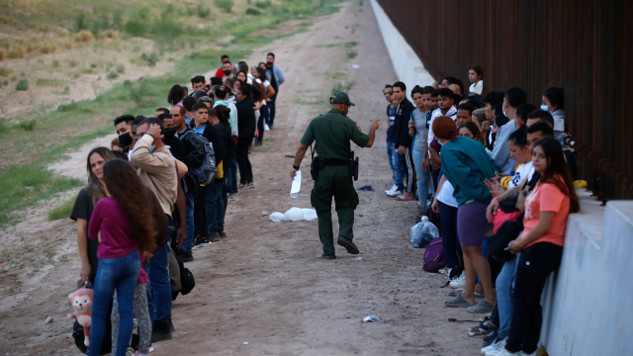
The migration crisis, which has become increasingly visible through heart-wrenching scenes at borders and dangerous journeys undertaken by individuals seeking a better life, is deeply intertwined with broader global issues. Climate change, economic disruption, and political dysfunction are significant factors fueling this crisis. Significantly, the United States' past interventions in various countries have played a role in exacerbating these issues, leading to the complex challenges these nations face today. The interplay of these elements creates a tapestry of desperation and hope, driving people to undertake dangerous journeys in search of safety and opportunity.
Current debates in the United States reveal a sharp divide in approaches to managing the migration crisis. On one side, the Republican Party demands a return to policies reminiscent of the Trump administration. These include stringent border controls and a 'hard-line' stance on immigration. Critics argue that such measures, while appealing to certain political bases, fail to address the root causes of migration. Instead, they perpetuate a cycle of desperation and illegal crossings, ignoring the complex socio-economic and political factors driving people to leave their home countries.
Biden Administration's Approach
The accusation by Republican and right-leaning media that the United States has "open borders" under President Biden's administration is not accurate when examined against the realities of U.S. immigration policies and border enforcement measures. To understand why this claim is false, it's essential to look at several key aspects:
-
Continued Enforcement of Border Policies: Since taking office, the Biden administration has continued to enforce and implement various border security measures. This includes the continued operation of border patrol and customs agencies that actively monitor and secure the border. While specific policies have changed or been re-evaluated under the Biden administration, these changes do not equate to an abandonment of border enforcement.
-
Title 42 and Other Immigration Policies: The Biden administration has upheld several policies from previous administrations that impact immigration and border control. For instance, Title 42, a public health order implemented during the Trump administration due to the COVID-19 pandemic, allowed for the rapid expulsion of migrants at the border. Despite criticism from various quarters, this policy has been used extensively by the Biden administration to expel a significant number of migrants.
-
Misinterpretation of Asylum Policies: The Biden administration's approach to asylum seekers has often been misconstrued as "open borders." While there has been a more humane approach towards those seeking asylum (a legal right under international and U.S. law), this does not imply unrestricted border crossing. Asylum processes involve legal procedures, screenings, and, often, prolonged waiting periods for adjudication.
-
Investment in Border Resources: The administration has also invested in resources and technologies to enhance border security, including surveillance technology and infrastructure improvements. These investments indicate a commitment to maintaining secure borders while also ensuring the humane treatment of migrants.
-
Regularization of Certain Immigrant Groups: Efforts to provide citizenship pathways for certain groups, such as DACA (Deferred Action for Childhood Arrivals) recipients, are sometimes misrepresented as open borders. However, these efforts are part of a broader immigration reform agenda and do not equate to unrestricted migration.
-
Continuation of Deportations: Deportations of undocumented immigrants have continued under the Biden administration, further countering the claim of open borders. These deportations are carried out following legal processes and considerations.
-
Border Challenges and Misrepresentation: While the Biden administration faces challenges in managing many border crossings and an evolving immigration landscape, it's essential to differentiate between the complexities of border management and the oversimplified concept of open borders. The reality involves a multifaceted approach that balances border security with humanitarian considerations.
The notion of "open borders" under the Biden administration mischaracterizes immigration policies and border security measures in place. The administration's approach involves maintaining border security, adhering to legal processes for asylum and immigration, and addressing humanitarian concerns, all of which are far from the concept of unrestricted or unregulated borders.
Supplementing this approach, President Biden's administration has taken steps to address the migration issue through diplomatic and humanitarian efforts. A notable initiative is the deployment of Vice President Kamala Harris to countries in the South, the origin of many migrants. The goal is to work collaboratively with these nations to create conditions encouraging people to remain in their home countries. This strategy involves addressing the root causes of migration, such as economic instability, climate change effects, and governance issues. By fostering better living conditions and opportunities at home, the Biden administration aims to mitigate the need for dangerous migration journeys.
Harsh Treatment Of Migrants
House Bill 20, a proposed legislation in Texas aiming to establish a militarized border force with extensive powers, represented a misguided approach to addressing the immigration crisis. This bill, far from offering a viable solution, poses severe risks to civil liberties, exacerbates human rights issues, and threatens to heighten tensions at the border.
The bill's strategy of employing armed citizens and granting them broad immunity is fraught with danger. It effectively sets the stage for potential abuse and the use of excessive force. Allowing untrained individuals to assume law enforcement roles in a highly charged environment is a recipe for disaster. This arrangement significantly increases the likelihood of racial profiling, discriminatory actions, and vigilante behavior against migrants. Additionally, providing immunity to these individuals undermines the principle of accountability, creating an environment where misconduct could go unpunished.
Furthermore, House Bill 20 perpetuates a climate of fear and antagonism towards migrants rather than addressing the underlying causes of migration. The rhetoric used in the bill, which focuses on "repelling" border crossers and targeting "cartel operatives," wrongly categorizes migrants as inherent threats. This perspective not only dehumanizes individuals fleeing dire situations like poverty, violence, or persecution but also disregards the complex socio-economic and political factors that drive migration. Such a stance fails to address the immigration issue at its root and instead demonizes those in desperate circumstances.
In sum, House Bill 20 is a dangerous deviation from a humane and practical approach to immigration. It leans towards a policy of intimidation and force, neglecting the essential elements of due process and respect for human rights. A proper solution to the immigration crisis requires comprehensive strategies that confront the fundamental causes, ensure fair legal processes, and maintain the dignity of all individuals involved. House Bill 20, emphasizing aggression and division, strays far from these principles, potentially leading to more harm and discord in an already complex situation.
In 2023, Texas Governor Greg Abbott took a controversial step by directing the National Guard to install razor wire barriers along the Rio Grande. This measure included placing large buoys with anchored wire sections in the river. The move immediately sparked backlash from various quarters, including humanitarian groups, environmentalists, and legal experts. Concerns were raised about the potential dangers such barriers pose to migrants, local wildlife, and the river's ecosystem. In response, the Biden administration filed a lawsuit against Texas, arguing that the wire installation violated environmental regulations and international treaties. Subsequently, a federal appeals court intervened, temporarily restricting the state's authority to continue wire deployment pending further legal proceedings.
In addition to the deployment of barbed wire, Governor Abbott has implemented other controversial measures at the border. These include authorizing "mass apprehension" tactics, wherein large groups of migrants are detained and processed rapidly, raising serious questions about due process and fairness. Further militarizing the border zone, Abbott has deployed additional National Guard troops with authorization to arrest migrants found on private properties. These measures have been criticized for their potential ineffectiveness in deterring migration and creating additional risks for migrants.
The impact of these measures on the border situation is complex and multifaceted. There have been reports of injuries resulting from the barbed wire, along with growing concerns about the psychological and physical harm inflicted by the increasingly militarized environment. Critics argue that such actions not only exacerbate tensions at the border but also lead to more dangerous crossing attempts without addressing the underlying causes of migration.
In the face of these developments, many experts and advocates call for a comprehensive approach to immigration reform. This includes prioritizing legal pathways for migrants, investing in economic development in Central American countries, and ensuring the humane treatment of asylum seekers. Building cooperative relationships with countries of origin, addressing security concerns in those nations, and providing humanitarian aid are viewed as critical steps toward a more sustainable and humane solution to the challenges of immigration.
Staying informed and engaged in thoughtful discussions about these issues is crucial. Focusing on facts, respectful dialogue, and responsible action is essential for contributing to a more positive and constructive approach to the complex and evolving challenges of immigration at the border.
The Humanitarian Perspective on Immigration
Understanding and addressing the migration crisis requires a shift in perspective and recognizing the human dimension of this global challenge. The dehumanization of migrants, often seen in political rhetoric and policies, does significant harm both internationally and domestically. It undermines the values of compassion and empathy, which are essential for a harmonious global community. The migration crisis is not just about numbers and policies; it's about people with dreams, aspirations, and the right to safety and dignity. Addressing it necessitates policies that are effective, humane, and respectful of human rights.
We must remember that behind every statistic and policy debate are real people with stories, hopes, and dreams. It's a reminder of our shared humanity and the importance of approaching this crisis with compassion and understanding, not political posturing.
Resources for Further Exploration on the Migration Crisis:
General Information:
- United Nations High Commissioner for Refugees (UNHCR): Provides comprehensive information on refugee and migrant populations, including statistics, reports, and news updates.
- International Organization for Migration (IOM): Offers research, data, and resources on all aspects of migration, including forced displacement, trafficking, and development.
- Migration Policy Institute (MPI): A non-partisan think tank providing in-depth analysis on migration policy issues and data.
- American Immigration Council: Advocate for immigration reform and provides reliable information on US immigration policies and statistics.
Specific Topics:
- House Bill 20: Texas Tribune article with detailed analysis: https://www.digitaltrends.com/social-media/texas-law-house-bill-20/
- Barbed wire on the Rio Grande: New York Times article on the controversy and legal challenges: https://apnews.com/article/texas-border-razor-wire-immigration-lawsuit-bddc6b9f8ec2a2ef93511e619b842b96
- Human Rights Concerns: Human Rights Watch reports on human rights abuses against migrants at the US border: https://www.hrw.org/topic/refugees-and-migrants
- Root Causes of Migration: World Bank report on the economic and social factors driving migration: https://www.worldbank.org/en/topic/migration
Additionally:
- PBS FRONTLINE: Documentary series with in-depth explorations of important immigration issues: https://www.pbs.org/video/frontline-immigration-battle/
- The Refugee Project: Personal stories and resources for understanding the refugee experience: https://www.therefugeeproject.org/
- OpenDemocracy: Articles, podcasts, and videos on migration and related issues: https://www.opendemocracy.net/
About the Author
 Robert Jennings is co-publisher of InnerSelf.com with his wife Marie T Russell. He attended the University of Florida, Southern Technical Institute, and the University of Central Florida with studies in real estate, urban development, finance, architectural engineering, and elementary education. He was a member of the US Marine Corps and The US Army having commanded a field artillery battery in Germany. He worked in real estate finance, construction and development for 25 years before starting InnerSelf.com in 1996.
Robert Jennings is co-publisher of InnerSelf.com with his wife Marie T Russell. He attended the University of Florida, Southern Technical Institute, and the University of Central Florida with studies in real estate, urban development, finance, architectural engineering, and elementary education. He was a member of the US Marine Corps and The US Army having commanded a field artillery battery in Germany. He worked in real estate finance, construction and development for 25 years before starting InnerSelf.com in 1996.
InnerSelf is dedicated to sharing information that allows people to make educated and insightful choices in their personal life, for the good of the commons, and for the well-being of the planet. InnerSelf Magazine is in its 30+year of publication in either print (1984-1995) or online as InnerSelf.com. Please support our work.
Creative Commons 4.0
This article is licensed under a Creative Commons Attribution-Share Alike 4.0 License. Attribute the author Robert Jennings, InnerSelf.com. Link back to the article This article originally appeared on InnerSelf.com




























